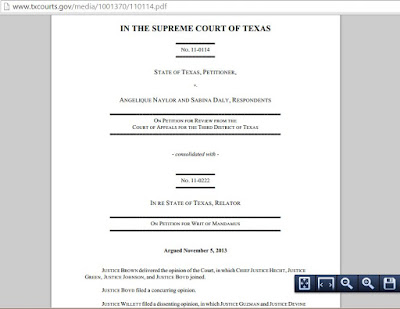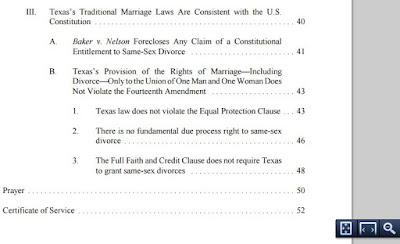One more same-sex marriage case to be cleared off the Texas Supreme Court's docket before the fiscal year ends
On July 7, 2015 the Attorney General filed a motion to dismiss the mandamus proceeding in which the AG had challenged a preliminary ruling by Travis County Judge Guy Herman in a probate case in which a same-sex partner sought recognition as an heir based on an alleged informal "common-law" marriage after her partner had died of cancer (apparently without a will).
In moving for dismissal the Attorney General took the position that the mandamus proceeding he had filed against the judge in that case had become moot based on the recent decisions of the Texas and U.S. Supreme Court in other cases involving same-sex marriage.
The Texas Supreme Court has yet to issue an order on the motion, but it is unopposed. The expected termination of the mandamus case in the Supreme Court will lift the stay imposed on the trial court, where the case will continue on the merits of the common-law marriage claim by Sonemaly Phrasavath, now that the prohibition of same-sex marriage recognition by Texas law is no longer valid, given that the U.S. Supreme Court has resolved the issue in favor of same-sex marriage as a constitutional right under the federal constitution in Obergefell v. Hodge. Judge Herman had refused to dismiss the application for heirship by Phrasavath that had been filed by family members of her deceased partner.
THE RULING THAT DREW KEN PAXTON'S IRE
PROBATE JUDGE GUY HERMAN'S
PROBATE JUDGE GUY HERMAN'S
ORDER ON SPECIAL EXCEPTIONS AND MOTION TO DISMISS
FILED BY FAMILY MEMBERS IN PROBATE COURT AGAINST
SONEMALY PHRASAVATH, A WOMAN CLAIMING TO BE THE SURVIVING
COMMON-LAW SPOUSE OF THE DECEASED
SONEMALY PHRASAVATH, A WOMAN CLAIMING TO BE THE SURVIVING
COMMON-LAW SPOUSE OF THE DECEASED
[partial reproduction]
 |
| Judge Guy Herman's order finding Texas prohibition of same-sex marriage unconstitutional under the Fourteenth Amended of the federal constitution |
TEXT OF STATE'S MOTION TO DISMISS
(converted from pdf file)
(Click on docket number and follow link to read the original)
No. 15-0135
In the Supreme Court of Texas
IN RE STATE of Texas,
Relator
Original Proceeding from
Probate Court No. 1
Travis County, Texas
MOTION TO DISMISS
PETITION FOR WRIT OF MANDAMUS
Relator State of Texas hereby moves to dismiss its petition for writ of mandamus. Real Parties in interest do not oppose this motion.
BACKGROUND
On February 17, 2015, Probate Court No. 1 of Travis County, Texas entered an interlocutory order in a probate proceeding that Texas Family Code § 2.401, Texas Family Code § 6.204(b), and Article I, § 32 of the Texas Constitution are unconstitutional insofar as they restrict marriage in the State of Texas to a union of a man and woman and prohibit the creation or recognition of marriage to same-sex couples, because such restrictions and prohibitions violate the Due Process Clause and the Equal Protection Clause of the Fourteenth Amendment to the United States Constitution.
2
MR Tab F at 1. The State immediately intervened and filed a mandamus petition and emergency motion for temporary relief in this Court. The State sought mandamus relief in the form of a stay or vacatur of the probate court’s holding on the constitutionality of Texas law pending this
Court’s resolution of that issue in State v. Naylor, 11-0114, In re Texas, No. 11-0222, and In re J.B. and H.B., 11-0024. On February 19, the Court granted the emergency motion for temporary relief, staying the probate court’s order. The mandamus petition is pending.
On June 19, 2015, the Court decided Naylor and In re Texas, and dismissed J.B. and H.B. without ruling whether Texas marriage law is consistent with the United States Constitution. On June 26, 2015, the United States Supreme Court issued Obergefell v. Hodges, No. 14-556, 2015 WL 2473451 (U.S. June 26, 2015). Obergefell held that the Fourteenth Amendment requires States to allow same-sex marriages and to recognize same-sex marriages from other States. 2015 WL 2473451, at *22-23.
3
ARGUMENT
The mandamus relief sought by this petition is moot in light of the Court’s disposition of Naylor, In re Texas, and In re J.B. and H.B., and the United States Supreme Court’s decision in Obergefell. Nevertheless, whether Real Party in Interest Powell can establish a common-law same sex
marriage prior to Obergefell is far from certain, and dismissal of the mandamus petition does not bear on the validity of such a claim. The mandamus petition should be dismissed as moot.
CONCLUSION
The motion to dismiss should be granted and the stay should be lifted.
4
Respectfully submitted.
KEN PAXTON
Attorney General of Texas
CHARLES E. ROY
First Assistant Attorney General
SCOTT A. KELLER
Solicitor General
/s/ Michael P. Murphy
MICHAEL P. MURPHY
Assistsant Solicitor General
State Bar No. 24051097
OFFICE OF THE ATTORNEY GENERAL
P.O. Box 12548 (MC 059)
Austin, Texas 78711-2548
Tel.: (512) 936-2995
Fax: (512) 474-2697
michaelp.murphy@texasattorneygeneral.gov
Counsel for Relator
5
CERTIFICATE OF CONFERENCE
/s/ Michael P. Murphy
Michael P. Murphy
Counsel for Relator
CERTIFICATE OF COMPLIANCE
This motion contains 390 words, counted consistent with Rule of
Appellate Procedure 9.4(i)(3).
/s/ Michael P. Murphy
Michael P. Murphy
Counsel for Relator
6
CERTIFICATE OF SERVICE
I certify that on July 7, 2015, the foregoing document was served
via File & ServeXpress or electronic mail upon counsel for real parties in
interest. A courtesy copy was also sent to counsel for real parties in
interest by electronic mail.
Kurt Kuhn
Lisa Bowlin Hobbs
KUHN HOBBS PLLC
3307 Northland Drive, Suite 310
Austin, Texas 78731
Tel.: (512) 476-6003
Fax: (512) 476-6002
Kurt@KuhnHobbs.com
Lisa @KuhnHobbs.com
Brian T. Thompson
Craig Hopper
HOPPER MIKESKA, PLLC
400 W. 15th Street, Suite 408
Austin, Texas 78701
Tel.: (512) 615-6195
Fax: (512) 610-1306
bthompson@hoppermikeska.com
Charles Herring, Jr.
Jess M. Irwin III
HERRING & IRWIN, LLP
1411 West Ave., Ste. 100
Austin, Texas 78701
Tel.: (512) 320-0665
Fax: (512) 519-7580
cherring@herring-irwin.com
jess@herring-irwin.com
Catherine A. Mauzy
MAUZY & TUCKER PLLC
1717 West 6th St., #315
Austin, Texas 78703
Tel.: (512) 474-1493
Fax: (512) 479-7910
cam@mauzylaw.com
Counsel for Real Party in Interest
Sonemaly Phrasavath
7
Michael B. Knisely
Jason S. Scott
OSBORNE, HELMAN, KNEBEL & SCOTT, LLP
301 Congress Avenue, Suite 1910
Austin, Texas 78701
Tel.: (512) 542-2000
Fax: (512) 542-2011
mbknisely@ohkslaw.com
jsscott@ohkslaw.com
Counsel for Real Parties in Interest James Powell and Alice Huseman
Respondent was served a copy by email and by U.S. Mail, sent July 7, 2015.
Hon. Guy Herman
Probate Court No. 1, Travis County, Texas
1000 Guadalupe, Room 217
Austin, Texas 78701
Tel.: (512) 854-9258
Fax: (512) 854-4418
Respondent
/s/ Michael P. Murphy
Michael P. Murphy
Counsel for Relator
























